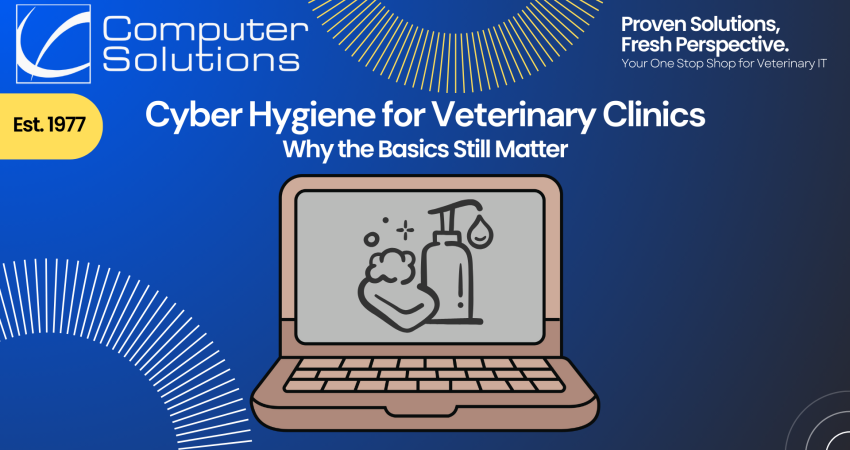
Posted by Computer Solutions on September 8, 2025
Veterinary practices have gone digital—cloud-based PIMS systems, mobile devices in exam rooms, and client communication tools running across multiple platforms. But with all that convenience comes one critical responsibility: keeping your systems and data secure.
And it turns out, the most effective way to prevent cyberattacks isn’t always a fancy new firewall or high-end antivirus. It’s your cyber hygiene—the foundational habits your clinic uses to stay protected.
Think of it as digital handwashing. Not glamorous, but absolutely essential.
What Is Cyber Hygiene?
Cyber hygiene is the set of everyday practices that reduce your risk of being hacked, infected with malware, or accidentally exposing client data. According to IBM’s 2023 Cost of a Data Breach Report, 82% of breaches involved cloud-stored data, and many could have been avoided with basic protections.
That’s why having a clear, enforceable cyber hygiene checklist matters for every clinic—whether you’re a one-location animal hospital or part of a growing group.
1. Secure Your Clinic’s Network
Your network is the backbone of your entire operation—and it’s also the front door attackers will try to walk through first.
- Use encrypted Wi-Fi with strong, regularly updated passwords
- Hide your SSID so the network isn’t easily discoverable
- Use firewalls that are kept up to date and actively monitored
- Require VPN access for any remote staff or third-party vendors
An unsecured network is like leaving your exam room door wide open overnight.
2. Train Your Staff to Spot Threats
Your team doesn’t have to be tech-savvy—but they do need to be trained.
Cybercriminals often get in through phishing emails, fake login pages, or malicious attachments. A few simple behaviors can prevent that:
- Never reuse passwords between systems
- Always verify the sender before clicking a link
- Enable multifactor authentication (MFA) where possible
- Report suspicious emails immediately to your IT provider
Many practices include these steps in their cyber hygiene checklist, reinforced with short quarterly training sessions.
3. Back Up Everything That Matters
From SOAP notes to radiographs, your clinic runs on data. If you lost it today, how long could you function?
- Backups should run daily (at minimum)
- Store at least one copy off-site or in a secure cloud
- Test restorations regularly to make sure they actually work
- Don’t forget: PIMS data, QuickBooks files, imaging systems, and HR records all need to be backed up
In the event of a ransomware attack, these backups may be your only lifeline.
4. Limit Access to Sensitive Data
The fewer people who have access to a system, the fewer chances there are for a mistake.
- Use role-based permissions in your PIMS, accounting tools, and file storage systems
- Only assign admin privileges to trusted IT professionals
- Immediately revoke access when an employee leaves your practice
- Maintain a list of active users and review it quarterly
This is often the most overlooked item on a cyber hygiene checklist, and it’s one of the most impactful.
5. Keep Your Software and Devices Updated
Outdated software and operating systems are a top entry point for cyberattacks. Updates often contain security patches that block known vulnerabilities—so don’t ignore them.
- Turn on automatic updates for workstations and servers
- Use a patch management tool or have your IT partner handle it
- Replace devices that are no longer receiving manufacturer support (including those still running Windows 10 after October 2025)
In short, if it’s too old to update, it’s too old to protect your clinic.
Why Cyber Hygiene Pays Off
Let’s be honest—keeping up with cybersecurity isn’t always exciting. But it’s far cheaper and easier to prevent a breach than to recover from one.
Poor hygiene can result in:
- Lost access to practice management systems
- Exposure of client financial data
- Damage to your clinic’s reputation
- Breach of cyber insurance requirements
- Expensive downtime (every minute counts when your schedule is full)
A clean cyber hygiene checklist gives your clinic stability, protection, and peace of mind.
Let’s Check Your Clinic’s Hygiene Together
At Computer Solutions, we help veterinary practices across the United States stay secure with real-world tools and practical support. We don’t just throw jargon at you—we build systems your team can understand and follow.
If you haven’t reviewed your clinic’s cyber hygiene in the last 6 months, it’s time.
Schedule a free Cybersecurity Risk Assessment today, and we’ll show you where the risks are—and how to fix them without disrupting your team.
Call 609.514.0100 or book your free assessment online here.
Want to read more about veterinary IT and cybersecurity? Check out last week’s blog here!
Discover more from Computer Solutions
Subscribe to get the latest posts sent to your email.







